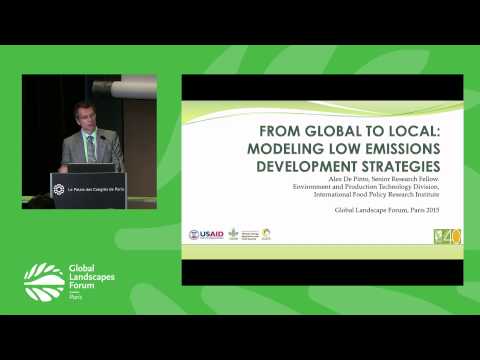Achieving food security is one of the essential components of the UN Sustainable Development Goals (SDGs), which were adopted in September of last year. While only a few goals specifically mention forestry and other land-based sectors, all 17 depend on healthy and sustainable landscapes for their achievement.
Over the past two years, the Global Landscapes Forum (GLF) has evolved into the world’s leading platform for discussing land-use issues. In Paris this past December, the Forum brought together approximately 3,200 stakeholders from across sectors, including forestry, agriculture, water, energy, law and finance.
At GLF in Paris, IFPRI staff hosted a discussion forum on the challenges faced by the agricultural sector due to climate change, and the available options in regional and global policies that could lead to healthy growth and stability.
If ‘business-as-usual’ farming continues under climate change conditions, scenarios project slower yield growth and rising food prices by 2050. Underdeveloped economic regions where food security is already problematic and populations are more vulnerable to shocks will suffer most.
Without substantial measures that address the challenges caused by increasing temperatures and frequencies of extreme weather events, losses in crop and livestock productivity are expected to reduce the rate of gain from technological advances and improved management practices. Furthermore, climate change is not only threatening the productivity of the world’s agricultural systems but it also carries consequences for a wide range of ecosystem services and people’s resilience.
One approach to create a responsive institutional environment that was discussed is to establish decision-support mechanisms for agricultural, climate change, and food security policies that use new data that is easy to update, modeling output that can be customized, and innovative scenario assessments.
Panelists also underscored that modeling environments must be designed to integrate seamlessly into the national development processes such as planning, project evaluation, and investment programming. However, the adoption of new technologies and desirable agricultural practices needs to be evaluated with respect to other relevant land uses.
In fact, the best opportunities to increase resilience and reduce emissions might come from working at the landscape level. The innovative use of accurate data, model outputs, and alternative scenarios for the formulation of climate change policies will be essential to combat climate change effectively, and transition towards resilient, low-carbon societies and economies.
Key outcomes from GLF
- 3,200 participants from 135 countries, including:
- 19 Ministers and Heads of State
- 148 organizations facilitating discussions
At the Forum, participants committed to:
- restoring 128 million hectares (ha) of degraded and deforested landscapes
- protecting watersheds across the Andes, led by 125 city and regional governments
- the first and only payments for ecosystem services initiative in the Pacific Islands
- the International Partnership for Blue Carbon led by the Governments of Australia, Costa Rica, and Indonesia







